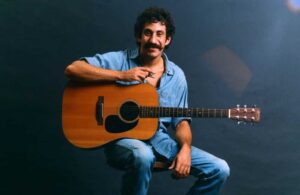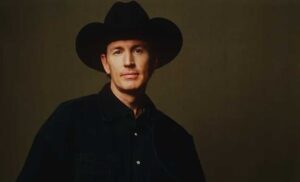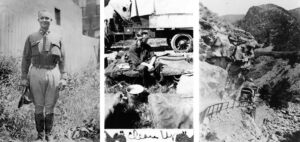Leon Everette may have grown up in Queens, New York, but his South Carolina roots were pure country.
During his childhood, Everette didn’t aspire to be a musician. He said the radio was always on, but it was just background noise for an otherwise urban upbringing.
In fact, it wasn’t until Everette joined the U.S. Navy and was assigned to an aircraft carrier in the South Pacific that he developed an interest in music. His fellow seamen had a variety of instruments with which to while away the hours. During a stopover in the Philippines, Everette purchased a guitar and smuggled it aboard. Before long, he was eyeballing other naval musicians and learning their techniques and picking up the notes by ear.
By the time his stint in the Navy was up, Everette had won a singing contest. He returned to South Carolina with a country music career on his mind. Unfortunately, it had to wait while Everette made a living, working for a power and gas company.
But Everette had learned to thrive on applause, and the power industry didn’t offer the residuals he yearned for.
Against the wishes of his wife and family, Everette decided to pursue a career in the music business. After a fallout with his boss at the power company, he abruptly quit, bought a new guitar, formed a band and started playing clubs in South Carolina and Georgia.
The band was popular, but Everette was the only member who yearned to pursue a career in music. Even winning a contest that included a recording contract with a small label didn’t convince his fellow bandmates, and Everette soon set out on his own. He went to Nashville, where that recording deal offered him very little leverage — but he did manage to crack a door into the industry. He continued to travel solo to Nashville, hoping he’d grab someone’s ear and get a real shot on 16th Avenue.
That chance finally came.
In 1976, Everette was working in the mail room of True Records, when the company heard that a rival, Doral Records, had released Everette’s first single, “Running State of Mind.” True Records took notice and decided to give Everette a shot.
It just so happened that Everette’s first recording session was about the time of Elvis’ death. He recorded a tribute song to the King of Rock ‘n Roll, and it met with immediate success — but only become it was the first out of the gate. As other artists released their own tributes, the popularity of Everette’s song plummeted.
Still, Everette’s producers were intrigued with what they heard, and pressured him to record pop music. Everette refused. As far as he was concerned, it was country or nothing. He was so bullheaded about it that when the label threatened to drop him unless he met its terms, he gladly walked away.
Not long after the breakup with True Records, Everette performed what he viewed as a farewell show in Iowa. He’d taken a shot at music and didn’t see eye to eye with the industry about his talents, so he decided a 9-5 job back in South Carolina would be his next move. But first, he had to fulfill a contract and perform in the Midwest. There, he met a supportive Florida businessman who knew little about music but offered to bankroll Everette’s career.
Everette’s plans to return to the daily grind of an ordinary worker dissipated. Soon, the pair formed Orlando Records.
In 1978, Everette returned to Nashville and began to make contacts with songwriters. A chance meeting with Bill Rice of the Foster-Rice songwriting duo paid off. They wrote several chart singles including “We Let Love Fade Away” and “Never Ending Crowded Circle,” but Orlando Records was too small of a production company to make much headway on the radio.
Eventually, “Don’t Feel Like the Lone Ranger,” broke into the Top 30, and Orlando Records began to gain traction. Everette’s career desperately needed the boost of a major label, but the hardheaded performer wanted total control of his songs and production. RCA expressed interest, but the large company wasn’t about to give control to an unproven singer. However, when “Over You” hit the Top 10, the company reconsidered. In 1980, Leon Everette signed with RCA and received the creative license he craved.
“Giving Up Easy” and “I Keep Going Crazy,” Everette’s first two RCA releases, shot up the charts, both reaching the Top 10. This led to the release of his first RCA album, “I Keep Going Crazy,” a mix of country/rock and ballads. The album even included a version of Willie Nelson’s “It’s Not Supposed to be that Way.”
All the while, his stage show grew in popularity because of its high energy and hard-cranking music. Some described Everette as a hurricane on stage. It just so happened that a song of the same name became Everette’s top hit.
“Hurricane” is the story of Everette’s meeting with an old man while a hurricane churns “30 miles out in the Gulf Stream” off the Louisiana coast. As the bridge “looks lower” and the “shrimp boats hurry home,” Everette meets a man in the French Quarter of New Orleans who has little fear of what the hurricane might bring to the city. His attitude toward the storm is that “nobody taught ’er that it takes a lot of water to wash away New Orleans.”
“Hurricane” became immensely popular along the Gulf Coast and, coupled with its national airplay, the song reached No. 1 on the country charts. Leon Everette’s career was off to the races. He followed with three consecutive Top 10 hits — “Midnight Rodeo,” “Just Give Me What You Think is Fair” and “Soul Searching.”
Everette was a true force among male country performers throughout the mid-80s, although he began to fall from the charts after reaching No. 6 with “I Could’a Had You” in 1984. After his career waned, Everette accepted Jesus Christ as his savior and made the switch to gospel music. He remains active in the genre today.
Until next time, don’t let a late start or a negative attitude among your peers keep you down. Like Leon Everette, you may be a “Hurricane” lying in wait.
Since retiring from a career as an outdoor recreation professional from the State of Arkansas, Kris Rutherford has worked as a freelance writer and, with his wife, owns and publishes a small Northeast Texas newspaper, The Roxton Progress. Kris has worked as a ghostwriter and editor and has authored seven books of his own. He became interested in the trucking industry as a child in the 1970s when his family traveled the interstates twice a year between their home in Maine and their native Texas. He has been a classic country music enthusiast since the age of nine when he developed a special interest in trucking songs.













